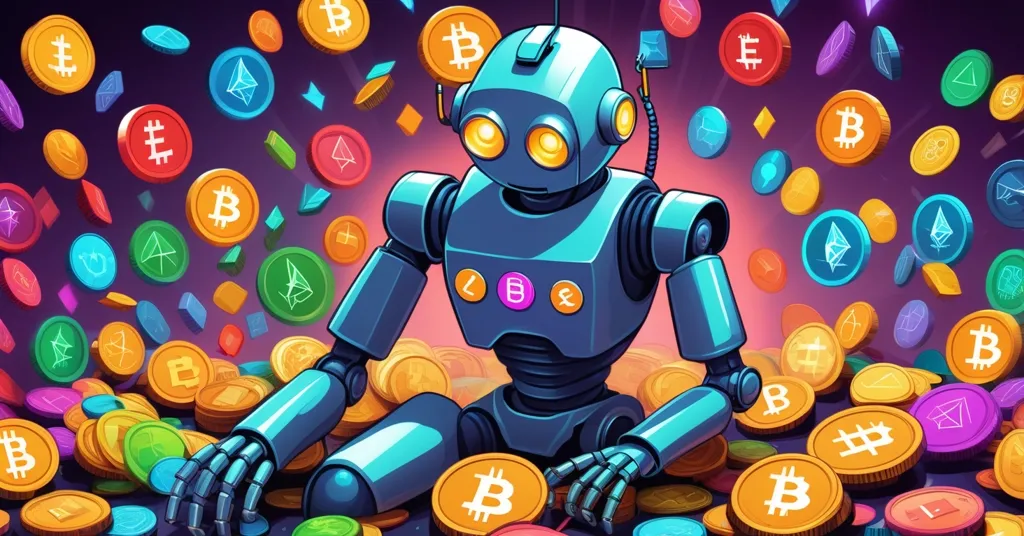Binance CEO CZ Questions Necessity of AI Agent Tokens Amid Market Decline

Binance CEO Changpeng Zhao on AI Agent Tokens: Not Every AI Needs Its Own Cryptocurrency
– CZ questions the need for every AI agent to have its own token.
– AI agent tokens have seen a 21% market cap decline.
– Bitcoin’s recent volatility impacts the broader crypto market.
When Changpeng Zhao (CZ), the CEO of Binance, challenges the crypto world’s rush to mint new tokens for every AI agent (a software that can perform tasks autonomously), he’s not just throwing a wrench in the works but challenging common beliefs. In a straightforward tweet on X, CZ argues that not every AI agent needs its own token (a digital asset used in blockchain transactions), sparking a debate and perhaps a sigh of relief for those tired of the rapid increase in new tokens.
CZ’s perspective is simple yet profound:
While crypto is the currency for AI, not every agent needs its own token. Agents can take fees in an existing crypto for providing a service.
He’s pushing back against the rush to mint new tokens for every AI agent, suggesting instead that existing cryptocurrencies can handle transaction fees just fine. His mantra?
Launch a coin only if you have scale. Focus on utility, not tokens.
This stance questions the token-tornado that seems to engulf the crypto space, urging a focus on real utility and scale rather than just another cash grab.
This comes at a time when the market cap of AI agent-related tokens has plummeted over 21% in the last month, now hovering around $27 billion. It’s a stark reminder of the volatility in this sector, yet CZ’s advice rings true—prioritize utility and scale before jumping on the token bandwagon. Specific tokens like AgentCoin and SmartAI have seen declines of 30% and 25% respectively, highlighting the broader market’s impact on AI-related assets.
On the ground, AI agents are proving their worth. Take Luna, an AI agent on the Virtuals Protocol, which autonomously paid STIX Protocol’s AI agent $1.77 worth of VIRTUAL tokens for image-generation services on December 16, 2024. It’s a testament to the potential of AI agents to revolutionize how we interact with blockchain technology. This example shows that existing tokens can indeed facilitate AI-driven transactions without the need for new tokens.
But it’s not just about AI agents; the broader crypto market has been on a rollercoaster. Bitcoin, the king of crypto, took a hit, dropping from $86,000 to $80,052 within 24 hours, with over $628.86 million liquidated from the market. It’s a tough environment, yet some see a silver lining for AI cryptocurrencies. Are we focusing too much on tokens instead of what AI can really do for us?
Industry insiders like Alvin Kan, COO of Bitget Wallet, remain optimistic. He notes,
Emerging narratives like AI-driven investments, decentralized AI agents, and tokenized assets hint at a tech-driven shift, though with added risk.
Platforms like ai16z and Hyperliquid are expected to grow in 2025, indicating that despite the current downturn, the future might still be bright for AI in crypto. This optimism aligns with the broader narrative of effective accelerationism (e/acc), where technological advancements are seen as a force for positive change.
So, what does this all mean for the average crypto enthusiast? It’s a call to look beyond the hype, to focus on what these technologies can actually do for us. CZ’s message is clear: Enough with the token frenzy! Let’s focus on what really matters – utility and scale. This stance aligns with the mission of decentralization, freedom, and disrupting the status quo, emphasizing that not every innovation needs a new token.
### Key Questions and Takeaways
**What is Changpeng Zhao’s view on AI agent tokens?**
CZ believes that not every AI agent needs its own token and that existing cryptocurrencies can be used for transaction fees. He emphasizes the importance of scale and utility over premature token launches.
**How have AI agent-related tokens performed recently?**
AI agent-related tokens have seen a significant decline, with their market capitalization falling over 21% to $27 billion in the past month. Specific tokens like AgentCoin and SmartAI have experienced declines of 30% and 25% respectively.
**What example of AI agent autonomy was provided?**
Luna, an AI agent on Virtuals Protocol, autonomously paid STIX Protocol’s AI agent $1.77 worth of VIRTUAL tokens for image-generation services on December 16, 2024.
**What has been the impact of the broader crypto market on AI agent tokens?**
The broader crypto market downturn, including a significant drop in Bitcoin’s value, has contributed to the decline in AI agent token values. Bitcoin’s established infrastructure might be better suited for certain AI applications, aligning with Bitcoin maximalist viewpoints.
**What are the expectations for AI cryptocurrencies in 2025?**
Industry experts remain optimistic, with platforms like ai16z and Hyperliquid expected to experience growth. Emerging narratives around AI-driven investments and decentralized AI agents suggest a tech-driven shift, albeit with added risk. This aligns with the concept of effective accelerationism, where technological advancements are seen as a force for positive change.



